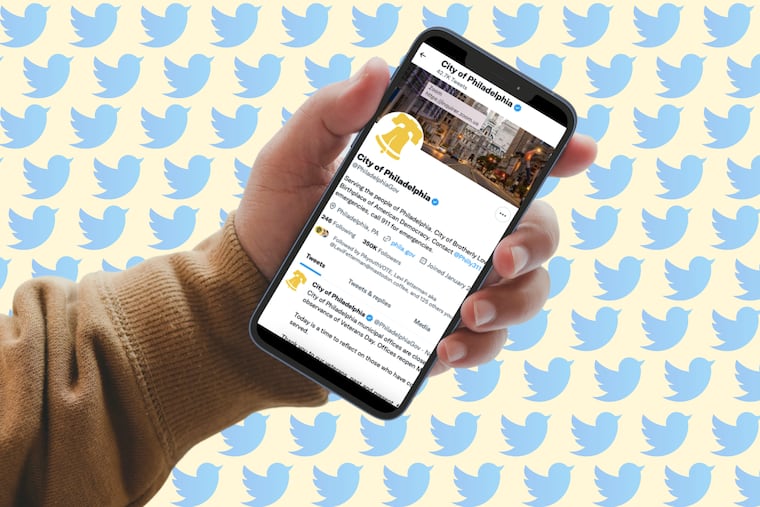Imposter accounts had a heyday last week on Twitter. How will Philadelphia accounts respond?
The City of Philadelphia’s Twitter account has more followers than double its Instagram and Facebook followers combined.

As changes to Twitter continue, brands with a major presence on the social media platform are thinking about Plan B. Now, local users — including government agencies, politicians, and brands — are weighing their future on the platform.
Last week, Twitter introduced — and days later announced it would pause — subscriptions to Twitter Blue, which allowed anyone to purchase a blue “verified” checkmark for their profile for $8 a month.
Blue checks were previously reserved to authenticate notable public figures and brands. Twitter Blue’s added functions were part of a sales play for its new owner, billionaire Elon Musk, whose management approach has been sharply criticized.
But things quickly devolved into chaos on the bird app, as a surge in fake accounts and tweets with purchased “verified” status shared misinformation across the site.
Fake ‘insulin is free now’ tweet prompts Big Pharma company to pause Twitter activity
A phony Nintendo account tweeted a photo of Mario flipping the bird. A Pepsi impersonator said that “Coke is better.” A fake LeBron James account told fans he was requesting a trade from the Lakers. Fake tweets from politicians across party lines were passed around.
The tweets seemed credible at a glance because of their seemingly legit Twitter names (@ChiquitaBrands vs. @Chiquita), profile photos, and shiny blue checks.
Perhaps the most consequential and widespread imposter tweet came from an account impersonating pharmaceutical company Eli Lilly & Co.
“We are excited to announce insulin is free now,” the fake account tweeted last Thursday. The false tweet was shared millions of times before Twitter removed it six hours later. As reported by the Washington Post, the tweet prompted the real Eli Lilly office to scramble, fearing it would undermine its own reputation.
The imposter account’s tweet was seized upon by advocates for affordable and free health care, including Sen. Bernie Sanders (I., Vt.), who used what he knew to be a fake tweet to criticize insulin costs. By Friday, Eli Lilly’s share price dropped 4%. Some linked the drop to the fake tweet, but the Post noted that the decline in price was in line with other health-care companies that day.
Still, the fake tweet prompted a digital strategy change. The Post reported that Eli Lilly executives ordered a stop to all of its Twitter ad campaigns and paused its upcoming tweets for all its corporate accounts.
Twitter’s chaotic changes since Musk’s takeover have prompted other large companies to schedule meetings with the billionaire about the platform’s future and preserving brand safety, AdAge reported.
Politicians and municipalities rely on Twitter to get messages out
Local politicians and municipalities heavily rely on Twitter to quickly disseminate information.
To prove how easy it was to create a verified imposter account, the Post worked with Sen. Ed Markey (D., Mass.) to create a fake Twitter account posing as the senator. The account was verified within minutes and lasted a day before Twitter suspended the account along with the verification process entirely, citing “impersonation issues.”
Still, the suspension came only after Markey sent Musk a public letter — which Musk mocked on Twitter — criticizing its new direction and demanding more safeguards.
In California, government entities including the San Diego City Attorney’s Office announced they would be leaving Twitter, the California Globe reported.
“Twitter is moving in a troubling direction — one that promotes hatred, violence, bullying, and false information,” City Attorney Mara Elliott’s office tweeted last week. “It is not a forum where users can feel respected or safe. We deserve better. For that reason, my office will no longer communicate using Twitter.” Reports have shown an uptick in hate speech and racist language on the platform since Musk’s takeover.
Elliott’s tweet added that her office would continue to use Instagram and the office’s website for updates.
The City of Philadelphia’s Twitter account has more followers (350,000) than double its Instagram and Facebook followers combined. Like most major U.S. cities, Philadelphia uses its Twitter account for announcements ranging from public service and safety notices to livestreams of city news conferences.
The city’s communications department and mayor’s office haven’t made any firm decisions.
“We’ve been monitoring the situation and are in contact with our Twitter representatives about possible next steps and solutions,” Deputy Communications Director Joy Huertas said. “This is something that all organizations and institutions on the platform are currently dealing with.”